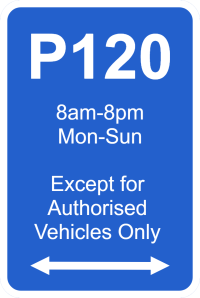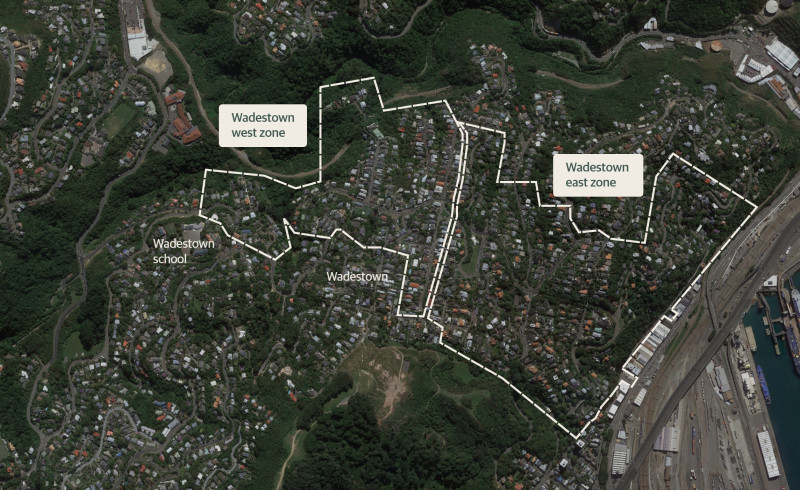Resident permits
Under the new-style parking schemes, resident permits cost $195 a year - subject to change in future years. Depending on demand, these are allocated on eligibility criteria. To be eligible to apply for a permit, you have to live in the parking scheme area and reapply annually.
Households that apply for and are granted an annual permit would be able to park for as long as they want to in P120 spaces which state authorised vehicles are exempt from the time restriction. Except for three spaces on Grosvenor Terrace there are no resident parking areas in Wadestown. These spaces would be replaced by the new scheme.
The new parking scheme would use three main tools to fairly share on-street parking:
- short-stay parking (P120 permit exempt) – the two-hour time-limit would not apply to residents who have permits
- eligibility criteria and priority groups, to guide how the permits are allocated
- a limit on the total number of permits issued for each parking zone (85 percent of the P120 spaces).
Two zones
The Wadestown parking scheme area would be divided into two zones:
- Wadestown east
- Wadestown west.
Resident permits issued would only apply to the zone where you live, not the whole Wadestown area. The area would be divided into zones to increase the chances people can park reasonably close to their homes.
If there was just one big zone, people who live in one part of the area but work in another could choose to commute within these suburbs and use their resident permit to park for extended periods during the day. This could make it more difficult for residents to park reasonably close to where they live.
Permits and timeline for applying
Resident permits under the new-style parking schemes cost $195 a year and you have to apply annually. Permits would be electronic, and the vehicle licence plate number would serve as the permit.
If the parking scheme is approved, more information about online applications and dates would be delivered to households before applications open.
Visitor day passes
All residential households in the Wadestown parking scheme area would be eligible to apply for an allocation of free visitor day passes every year. Even if you don't have a car, you may want to apply for some if people come to stay.
Businesses are not eligible for visitor passes.
Households with no off-street parking would be eligible for 50 free visitor passes each year.
Households with off-street parking would be eligible for 25 free passes each year.
Households would be able to buy additional visitor permits for $18 each/day.
Passes have to be activated online to a specific vehicle licence plate number in advance or on the day they are going to be used (no windscreen stickers or paper permits).
Tradespeople working in the area and needing to stay longer than two hours can use a visitor day pass activated by the resident they are working for or buy a trade parking coupon.
Enforcing the new P120 parking zones
The way parking is monitored in the city is changing. Wardens already use technology which allows them to tell by number plate alone whether vehicles are permitted to park in certain locations. Our wardens' ability to enforce parking restrictions more quickly and effectively in areas like this is going to significantly improve in the near future using these developing technologies.
Resident permit eligibility
Households and businesses with a vehicle registered to the business, whose main address is within one of the zones, would be eligible to apply for a resident permit for that zone only.
If approved, this would allow permit holders to park a designated vehicle in P120 permit exempt parking spaces in their zone for longer than two hours.
The new scheme would prioritise the allocation of permits to people and households who need them most including temporary and permanent mobility permit holders.
There would be a maximum of two permits per dwelling, except where there are multiple mobility permit holders in a single household. All mobility permit holder residents are eligible for a permit.
Anyone who would like to be considered for a permit would need to re-apply annually. The fee would likely change in the future (through annual and long-term plan fee changes) but is currently $195 for a 12-month period, or about 54 cents a day. This is consistent with resident parking permits elsewhere in the city. It would be possible to pay in instalments.
Receiving a permit one year is not a guarantee you'd necessarily get one in future years as the application process would depend on the number of households that apply. Numbers applying would be expected to increase as more people live in these areas.
A permit is not required for vehicles carrying out essential duties and statutory powers. This includes emergency vehicles attending an emergency or vehicles from utility companies actively doing unscheduled emergency repair works, such as repairing a water leak or reinstating power supply.
Motorcycles and scooters
If you want to be able to park a scooter or motorbike in P120 permit exempt spaces for longer than two hours (8am to 8pm, Monday to Sunday) you would need to apply for a permit.
Moving in and out of the suburb
If you move into the area during the year, you would be able to apply and may be granted a permit for the rest of the 12-month period at a cost consistent with the number of months left in the annual cycle. If you moved out of the parking scheme area, you would be able to apply for a partial refund.
Ineligible dwellings
The following types of properties would be ineligible for resident permits:
- halls of residence
- correctional facilities
- hotels
- motels
- hostels
- serviced apartments
- guesthouses
- properties operating solely as an Airbnb or other type of holiday let.
If a business (occupying commercial premises and paying business rates) or institution is permanently located within one of the zones (and has been there longer than three months), they may apply for an exemption permit.
Ineligible vehicles
You won’t be able to get permits for the following types of vehicles:
- non-motorised vehicles (such as trailers, and caravans), heavy goods vehicles, motorhomes, house buses, buses, and coaches
- boats
- all-terrain vehicles (ATVs) and quad bikes.
The number of resident permits available would be limited, and the total number of permits available would be allocated in rounds, by priority groups. Permits would be issued in order of priority until all applications are processed or until the permit cap for the area has been reached.
Any dwelling with a driveway or garage kerb ramp would be deemed to have off-street parking because a ramp prevents anyone else parking on this part of the street.
Garages would count as off-street parking even if the garage is being used for other purposes like storage or is too small for an owner’s current vehicle.
Allocation would be done in rounds in the following order in line with the Parking Policy 2020 (excluding group 2):
Group 1 – temporary or permanent mobility permit holders
Group 2 - electric vehicle owners with no off-street parking (note - in line with community feedback in late 2023, Councillors agreed this group will not have priority as part of the Wadestown parking scheme)
Group 3 – first permit for houses built before the 1930s or apartments built before the 1940s with no off-street parking
Group 4 – first permit for other dwellings built before 2020 with no off-street parking
Group 5 – first permit for businesses located within the P120 resident permit exempt parking zone
Group 6 – second permits for priority dwellings as outlined below
Group 6 (a) – multi-occupied dwellings (house share/ flat) built before the 1930s with no off-street parking
Group 6 (b) – multi-occupied dwellings (house share/flat) built between the 1930s and 2020 with no off-street parking
Group 6 (c) – businesses within a P120 resident permit exempt parking zone with no off-street parking spaces, including staff or customer spaces
Group 7 – first permit for all dwellings built before August 2020 with one or more off-street parking spaces
Group 8 – first permit for all dwellings built from August 2020 with or without off-street parking spaces
Group 9 – second permits for all other dwellings.
Find out more
Bus and bike route improvements
Find out about the proposed changes to Blackridge Road and Wadestown Road as we close another gap in the bike network.
Options we considered
Explore the options we considered to improve the parking challenges in Wadestown.
Supporting documents
Read the supporting documents for this proposal including the traffic resolution and plans

